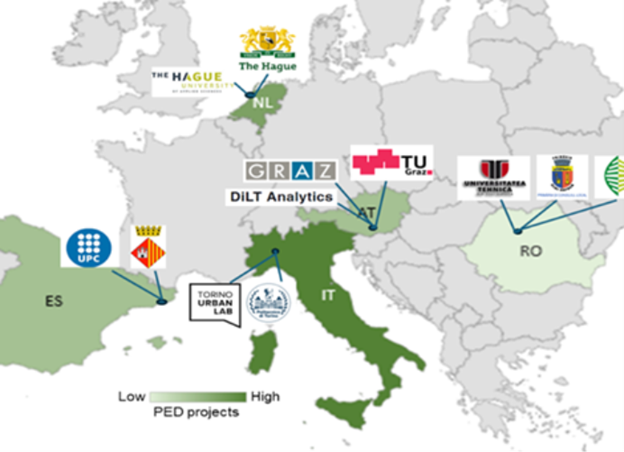Breadcrumb
EDUPED: Collaborating towards a sustainable and educational urban built environment
25 June 2025
The EDUPED project focuses on the integration of Positive Energy Districts (PEDs) into educational urban developments and strategies, with special attention to education and knowledge sharing.

On 21 and 22 January, the official kick-off of the EDUPED project took place, organised by the research group Future Urban Systems, part of the Centre of Expertise Mission Zero. This research project focuses on the integration of Positive Energy Districts (PEDs) into educational urban developments and strategies, with special attention to education and knowledge sharing. Researchers and policymakers gathered in The Hague to lay the foundation for innovation and feasible implementations within the context of this European urban project.
PEDs as a foundation for urban sustainability
The EDUPED project applies systemic approaches to continuously develop energy-positive educational urban areas. This goes beyond exploring and utilising current technical innovations such as district heating networks, heat pumps and local energy sharing; it also addresses how these technologies can be integrated within broader urban and social contexts. The project uses the educational urban environment as a basis to analyse energy flows and the spatial impact of PEDs.
The project also focuses on the interaction between the built environment and education. In developing knowledge products and experimental implementations within the participating campuses, the involvement of students and professionals plays a key role.
Multidisciplinary international collaboration
Researchers from THUAS are working over a three-year period with international partners on work packages (WPs) that focus on key aspects such as energy infrastructure, governance and co-creative models. Under the leadership of professor Dr Rizal Sebastian, the project involves the development of living labs in several European cities, including The Hague. These living labs serve as testing grounds where innovations are implemented, analysed and evaluated in real-life contexts.
Scalability and replicability are central themes throughout the EDUPED research project. This ensures that insights from the project can be applied across a variety of urban environments. As PEDs often require deviations from existing zoning plans, building codes and network access, a key challenge of the project is identifying legal and policy bottlenecks that hinder their implementation.
Outlook
Establishing a strategic implementation framework for PEDs within the European urban context is the focus of the upcoming research phase. This includes guidelines for urban partners, policymakers and participating educational institutions to accelerate the transition to energy-positive neighbourhoods.
The EDUPED project is carried out by The Hague University of Applied Sciences, in cooperation with Politecnico di Torino (Italy), Universitat Politècnica de Catalunta (Spain), Universitatea Tehnică Cluj-Napoca (Romania) and Technische Universität Graz (Austria), among others. The research is made possible by European grants and has the main objective: Research to accelerate the transition to PEDs in urban areas by using educational campuses as Living Labs.
More information
Driving Urban Transitions | De Haagse Hogeschool
Contact details
- Professor Future Urban Systems, Rizal Sebastian [email protected] / 06-18986913
- Student assistent Future Urban Systems, Dean Shenhav [email protected] / 06-30519607